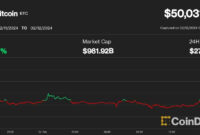Kevin O’Leary Says Bitcoin Is a “Rogue Currency” – cryptokinews.com
Shark Tank‘s Mr. Wonderful is one of cryptocurrency’s better-known supporters. But he isn’t blind to the issues the industry faces. And while he is a big believer in blockchain and crypto, it’s also fair to say he’s not that enamored with large parts of the community. In fact, he thinks die-hard crypto fans are stopping digital currencies from moving to the next level and beyond.
In fairness, the feeling’s mutual — O’Leary has come under fire from those same fans for his views, particularly on regulation. Let’s find out more about one of the big divisions in crypto and what it might mean for the industry as a whole.
Two of crypto’s biggest stumbling blocks right now
In a recent crypto conference, O’Leary sat down with Circle co-founder and CEO, Jeremy Allaire. Circle is the company behind the USDC stablecoin. Speaking at Converge22, the pair discussed crypto fatigue, how to increase adoption, and the role of increased regulation.
1. It’s too complicated
Both men agreed that crypto has a long way to go in terms of useability. If you’ve ever tried to set up your first crypto wallet or use some of the decentralized applications, you’ll likely agree. It’s doable, but your grandmother might struggle to make it happen. O’Leary said, “Wallets are too complicated for the everyman.” He added, “It’s a mess.”
Allaire put it a different way: “For the next 500 million people to a billion people to get involved in this, the crypto of it has to go into the background.” Taking the crypto out of crypto means making it more like sending an email. When you send an email, you don’t need to know what’s happening behind the scenes — what matters is that your message gets sent. The Circle co-founder thinks the same thing needs to happen with crypto. “I think this is a critical piece of the next wave of adoption,” he said.
2. Rogue crypto fans
O’Leary had some harsh words for certain quarters of the crypto community, labeling them as “rabid” and “rogue.” He believes they are holding the industry back. His concern is that old-school crypto enthusiasts don’t want regulation and see decentralization as the only way.
“There’s a really tight, small crypto community of really rabid fans if you want to call them that,” he said. “That’s — in my view really — starting to hurt this space because a lot of them don’t believe in regulation, a lot of them believe in decentralized only, a lot of them are rogue in terms of the way they think.”
The popular entrepreneur and successful investor is an outspoken advocate for crypto regulation, particularly when it comes to stablecoins. It was only when crypto became better regulated in Canada that O’Leary was able to invest. He thinks that regulation will bring trillions of institutional dollars into the market, money that’s currently sitting on the sidelines because the compliance departments in big firms won’t authorize crypto investments.
The issue for more traditional crypto supporters is that regulation flies in the face of the whole ethos of Bitcoin (BTC). Bitcoin was designed to be a decentralized digital currency that functioned without the involvement of banks or central authorities, and regulation would alter that premise.
What it means for investors
It’s been almost a year since Bitcoin hit its all-time high. Since then, prices have dropped considerably and the lead crypto is down 70% on last year’s high. The only real cause for celebration in recent months is that Bitcoin has lost some of its volatility. It’s hovered around $20,000 since mid-June.
Wider economic conditions are partly to blame for the prolonged bear market. Rising interest rates, the specter of an economic downturn, and an absence of the stimulus cash that helped spur crypto to those extraordinary highs have all caused investors to move away from riskier assets like crypto.
But that’s not the only issue. Confidence in the crypto market is low, particularly following the devastating collapse of Terra’s LUNA. And the concerns about usability and regulation raised by Allaire and O’Leary could both have an impact on how the industry performs long term. On the one hand, regulation could build confidence and more people might invest as a result. On the other, it could stifle a nascent industry and make life harder for crypto exchanges and investors.
However, it seems that O’Leary is misunderstanding what the underlying technology behind Bitcoin and other cryptocurrencies is all about. It’s not just about creating an accessory to the current monetary system. Instead, it’s about creating decentralized networks free from politics, state-censorship, and claims of ownership. If cryptocurrencies are merely intended to be an accessory to our current monetary system, then what is the point of it to begin with?

O’Leary says that he is waiting for the industry to “grow up” so he can play “real baseball there.” However, the cryptocurrency market will grow with or without his approval: regulatory clarity will likely come at the last stage of market maturation, and will also require some interpretation along the way. O’Leary essentially wants clear solutions for problems regulators have never grappled with before.
If we compare blockchain to the early internet, we see that both faced similar criticisms. However, what O’Leary doesn’t appear to grasp, is that we are dealing with not just a new financial instrument but a technology that promises a paradigm shift in how we understand value.
Kevin O’Leary does not look like he’ll be converted on the cryptocurrency question anytime soon, though. Repeatedly calling it “crypto-crap,” he falls into the same basket that Peter Schiff and others occupy, and continues to misunderstand what the industry is even about.


